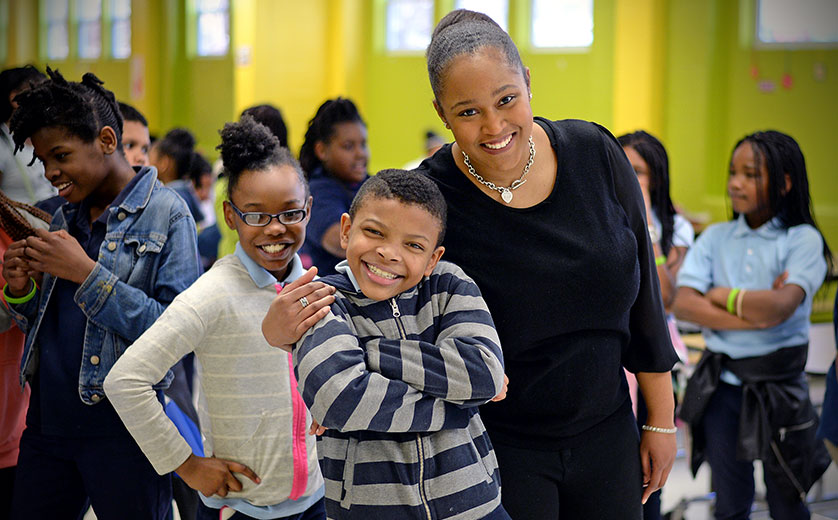As a social work practicum student, Keyria Jeffries will do anything to help the children of Fairview Primary in the Jennings School District. Her work is part of Jennings’ comprehensive, district-wide approach to reform that has made the district a national model.
“It’s about serving the whole child,” says Jeffries, an MSW student at the Brown School at Washington University in St Louis.
Jeffries’ students face many obstacles. Almost all of Fairview’s 276 students are poor. Some are homeless; others are survivors of violence. Indeed, the school is not far from where Michael Brown was shot and the ensuing unrest that destroyed many businesses. And last spring, students mourned together after a 6-year-old classmate died in a house fire with her baby brother and grandmother.
Those are challenges, says Jeffries, not excuses.
“Some people shrug and say, ‘Well, what can you do,’” Jeffries says. “The problems here are big, but they are not insurmountable. Just look at everything Jennings has accomplished by addressing the greater needs of students and the community.”
Under the visionary leadership of Superintendent Tiffany Anderson, who will be leaving this year to lead the Topeka School District, the Jennings School District recently regained state accreditation because of strides made both inside and outside the classroom. For instance: attendance. Fairview’s rate now matches the state average, an enormous accomplishment that boosts both student performance and state funding. Jeffries spends a big part of her day tracking down missing students.
“We are required to contact the state after 10 absences, but we don’t wait for that,” Jeffries says. “We reach parents and say, ‘What can we do to help?’ Maybe they are dealing with circumstances — trouble with transportation or housing. We’ve seen it all, heard it all, and we’re ready to help.”
Jeffries connects students and their parents to programs and community resources that can help.
“The kiddos may not know what our job title is, but they know this person can help you,” Jeffries says. “We are always getting smiles and hugs and hellos. They know this is a person who cares.”
Jeffries’ practicum work supports her education as a Brown student. The school’s Urban Education Initiative prepares students to take leadership roles in city schools, creates partnerships with public and charter schools across the region, and helps schools implement and measure programs to improve the social, emotional and community health of their students.
“The combination of theory and practice has really prepared me for this work,” says Jeffries, who also served as a practicum student at Roosevelt High School in St. Louis Public Schools. “In class, I get to hear what things are like in Cahokia (Illinois), in East St. Louis (Illinois), in Pattonville (Missouri). I can’t be in more than one place, but hearing about those experiences from other students has broadened my knowledge.”
Jeffries, who is from Chicago, will graduate in May and pursue a career in urban education in the St. Louis area. She is one of dozens of Brown School students focusing their coursework and fieldwork on urban education, and that number continues to grow.
The Brown School and Washington University are committed to developing a new generation of leaders committed to urban education, and they recently launched the Wendt Fellowship Program in St. Louis School Leadership to provide full-tuition financial support for such students. The goal is to inspire more skilled professionals to dedicate their talents to St. Louis area schools.
“The modern challenge of creating high performing schools involves both educational and instructional leadership, as well as sophistication about the family, social, and community contexts of students,” says Edward F. Lawlor, dean and the William E. Gordon Distinguished Professor at the Brown School. “As a School, part of our commitment to the community is the education of professionals to take on the next generation of urban school roles.”
